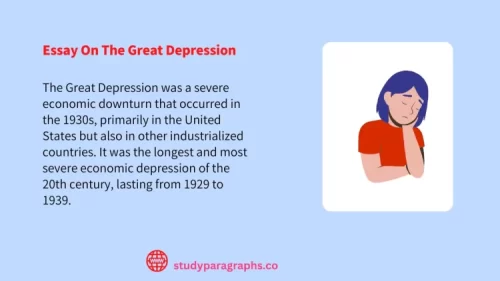The Impact of the Great Depression on American Society & Culture
An in-depth examination of the Great Depression, exploring its causes, effects, and legacy on American economy, society and culture.
Short Essay On The Great Depression
Outlines
- Introduction
- Causes
- Impacts
- Solution
- Conclusion
The Great Depression was a severe economic downturn that occurred in the 1930s, primarily in the United States but also in other industrialized countries. It was the longest and most severe economic depression of the 20th century, lasting from 1929 to 1939.
The Great Depression was caused by a combination of factors, including the stock market crash of 1929, a decline in consumer spending, and a decrease in international trade. The crash of the stock market, caused by a combination of speculation and economic inequality, led to a decline in consumer confidence and a decrease in spending. This led to a decline in production, which in turn led to a decrease in employment and a decline in incomes.
Next Essay: on-goals
The Great Depression had a severe impact on individuals and communities. Unemployment rates soared, reaching 25% in the United States, and many people were left without jobs, homes, and food. Banks failed, and people lost their savings. Families were forced to rely on government assistance and charity to survive.
The Great Depression also had a significant impact on the global economy. International trade declined, and countries raised tariffs and other trade barriers, which further exacerbated the economic downturn.
Governments around the world attempted to address the depression through a variety of policy measures. In the United States, President Franklin D. Roosevelt’s New Deal program implemented a number of policies aimed at stimulating the economy, such as public works projects, relief programs, and financial reforms.
Conclusion
In conclusion, The Great Depression was a severe economic downturn that occurred in the 1930s, primarily in the United States but also in other industrialized countries. It was caused by a combination of factors, including the stock market crash of 1929, a decline in consumer spending, and a decrease in international trade. The Great Depression had a severe impact on individuals and communities, causing high unemployment, poverty, and loss of savings, as well as on the global economy. Governments around the world attempted to address the depression through a variety of policy measures, such as public works projects, relief programs, and financial reforms. It was one of the most significant events of the 20th century and its impact is still felt today
FAQs:
What caused the Great Depression?
The Great Depression was caused by a combination of factors, including economic and financial speculation, a decline in consumer spending, and a stock market crash. The stock market crash of 1929, known as the Wall Street Crash, marked the beginning of the Great Depression and led to a widespread loss of confidence in the American economy.
How did the Great Depression impact the American people?
The Great Depression had a devastating impact on the American people, causing widespread poverty and unemployment. Many Americans lost their homes, savings, and jobs, and struggled to make ends meet. The Depression also had a significant impact on American society and culture, leading to a decline in morale and a rise in political extremism.
What measures were taken to end the Great Depression?
The Great Depression was ended by a combination of government intervention and economic recovery. The New Deal, a series of programs and policies introduced by President Franklin D. Roosevelt, aimed to provide relief, recovery, and reform to the American people and restore confidence in the economy. Additionally, the United States’ entry into World War II led to an increase in government spending, which helped to stimulate the economy and bring about the end of the Great Depression.

Hello! Welcome to my Blog StudyParagraphs.co. My name is Angelina. I am a college professor. I love reading writing for kids students. This blog is full with valuable knowledge for all class students. Thank you for reading my articles.



![What Part of Speech is Down [ Adjective, Adverb, Noun, Preposition ] What-Part-of-Speech-Down](https://studyparagraphs.co/wp-content/uploads/What-Part-of-Speech-Down-300x169.png)